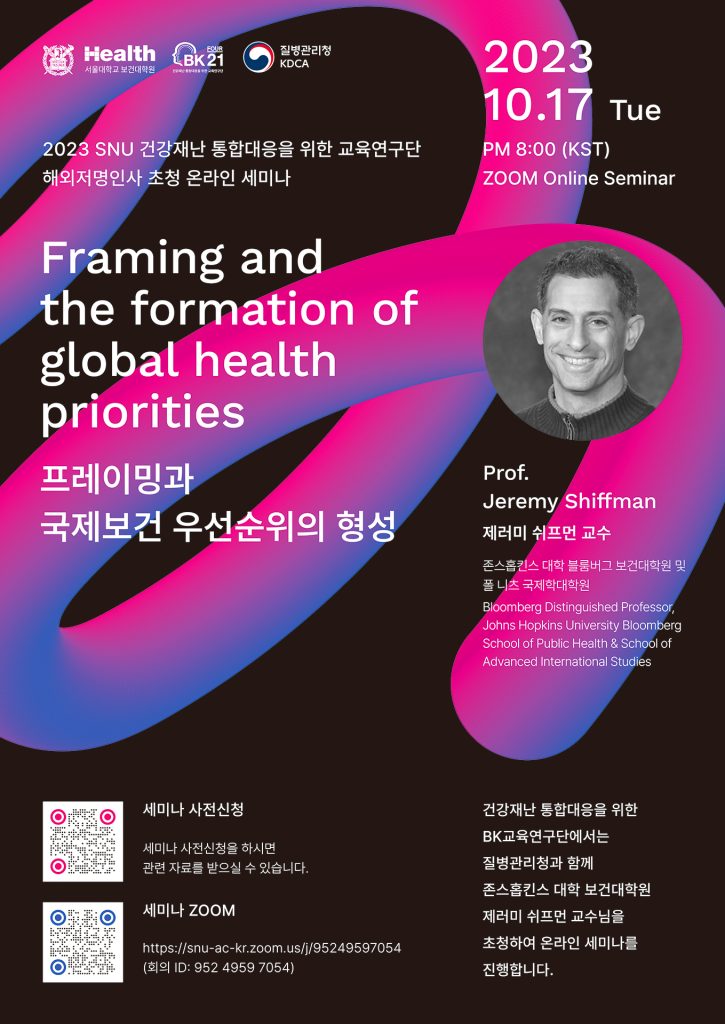세미나정보
10/17(화), 서울대학교 보건학과 BK교육연구단 해외연자 초청 온라인 세미나
작성자
보건대학원
작성일
2023-10-10
조회
339
10/17(화), 서울대학교 보건학과 BK교육연구단 해외연자 초청 온라인 세미나
건강재난 통합대응을 위한 BK교육연구단에서는 질병관리청과 함께 온라인 세미나를 진행합니다. 연자인 제레미 쉬프먼 교수는 존스홉킨스 대학 블룸버그 보건대학원 및 폴 니츠 국제대학원에 재직중이며, 국제 보건 거버넌스에서 건강 정책 결정의 정치를 연구하는 정치학자입니다. 요번 강의는 “프레이밍과 국제보건 우선순위의 형성”을 주제로 다룹니다. 많은 참여와 관심을 부탁드립니다.

●연자: 제레미 쉬프먼 교수
●일시: 2023년 10월 17일(화) 저녁 8시
●방식: 온라인 줌 세미나
●세미나 신청(사전신청을 해 주시면 세미나와 관련한 자료 등을 보내드립니다)
https://forms.gle/BP27f9MuubkTKgwG9
●세미나 접속링크(Zoom Online Seminar)
https://snu-ac-kr.zoom.us/j/95249597054 (회의 ID: 952 4959 7054)
● 주관: 서울대학교 보건대학원 보건학과 BK 건강재난 통합대응을 위한 교육연구단
● 문의: 보건대학원 보건학과 BK교육연구단 (irhd@snu.ac.kr)
강의 소개
Why historically have some global health issues, such as HIV/AIDS, received considerable attention and resources, while others of comparable severity, such as diabetes, have not? The talk will consider this question, drawing on an article recently published in The Lancet concerning the role of framing in shaping differences in the levels of priority that health issues receive. The article provides evidence on the influence of three framing processes?securitization, moralization, and technification?in shaping priority levels for global health issues. Securitization refers to an issue's framing as an existential threat, moralization as an ethical imperative, and technification as a wise investment that science can solve. The article’s primary finding is that the ascription of an issue as a security concern, an ethical imperative, or a wise investment is historically contingent: it is not inevitable that any given issue will be framed in one or more of these ways.
●일시: 2023년 10월 17일(화) 저녁 8시
●방식: 온라인 줌 세미나
●세미나 신청(사전신청을 해 주시면 세미나와 관련한 자료 등을 보내드립니다)
https://forms.gle/BP27f9MuubkTKgwG9
●세미나 접속링크(Zoom Online Seminar)
https://snu-ac-kr.zoom.us/j/95249597054 (회의 ID: 952 4959 7054)
● 주관: 서울대학교 보건대학원 보건학과 BK 건강재난 통합대응을 위한 교육연구단
● 문의: 보건대학원 보건학과 BK교육연구단 (irhd@snu.ac.kr)
강의 소개
Why historically have some global health issues, such as HIV/AIDS, received considerable attention and resources, while others of comparable severity, such as diabetes, have not? The talk will consider this question, drawing on an article recently published in The Lancet concerning the role of framing in shaping differences in the levels of priority that health issues receive. The article provides evidence on the influence of three framing processes?securitization, moralization, and technification?in shaping priority levels for global health issues. Securitization refers to an issue's framing as an existential threat, moralization as an ethical imperative, and technification as a wise investment that science can solve. The article’s primary finding is that the ascription of an issue as a security concern, an ethical imperative, or a wise investment is historically contingent: it is not inevitable that any given issue will be framed in one or more of these ways.
